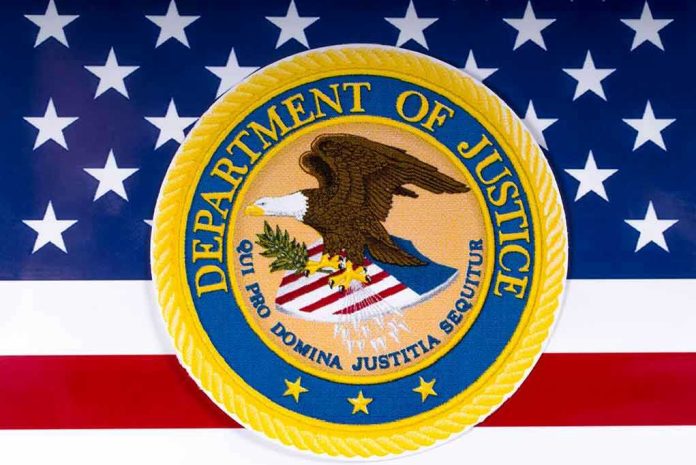
After years of alleged federal hostility, a new Trump administration task force claims it has uncovered widespread anti-Christian bias under Biden, vowing to restore religious liberty and protect faith-based Americans from government overreach.
Story Snapshot
- The Trump administration released a report alleging systematic anti-Christian bias in federal agencies during the Biden years.
- A new task force led by Pam Bondi was formed to investigate, recommend reforms, and safeguard religious liberty.
- Policies repealing protections for faith-based groups and controversial federal actions fueled claims of government hostility toward Christians.
- The task force’s partisan nature and methodology have drawn criticism, with some warning of potential threats to church-state separation.
Task Force Formed in Response to Alleged Anti-Christian Bias
President Trump announced the formation of the Task Force to Eradicate Anti-Christian Bias at the National Prayer Breakfast, signing an executive order to launch the initiative. Chaired by Attorney General Pam Bondi, the task force claims to have documented numerous cases of anti-Christian bias during the Biden administration. Their initial report cites federal agency actions, policy shifts, and controversial enforcement decisions as evidence, positioning the task force as a corrective to years of perceived government hostility toward Christians.
The report and its recommendations come after a series of incidents that alarmed faith-based communities. In 2023, an FBI memo categorized “radical-traditionalist” Catholics as potential domestic terrorism threats—a label later retracted after public backlash. Throughout 2023 and 2024, Christian institutions reported increased vandalism and violence, with many conservatives criticizing what they saw as a muted or inadequate federal response. The Trump-aligned narrative frames these events as the culmination of a broader pattern: the alleged weaponization of federal agencies against Christians and traditional values.
Federal Policies Fuel Accusations of Religious Hostility
Under the Biden administration, several policy changes were viewed as hostile by many in the faith community. The Department of Education pursued efforts to repeal religious-liberty protections for faith-based campus groups, while the Equal Employment Opportunity Commission enforced anti-discrimination rules on gender identity—moves that some Christian organizations saw as infringing on their beliefs. The Department of Health and Human Services implemented policies affecting faith-based foster care providers, and the controversial decision to declare March 31, 2024—Easter Sunday—as “Transgender Day of Visibility” was widely criticized as a slight to Christians. These actions, combined with reports of violence against Christian institutions, intensified claims of a targeted campaign against religious Americans.
Supporters of the task force argue these policies and incidents reflect a dangerous trend: the erosion of constitutional protections for religious liberty and the marginalization of Christian voices in public life. They contend that federal overreach and “woke” agendas have undermined traditional principles and emboldened attacks on faith-based communities. The Trump administration’s response aims to reverse these trends, promising to investigate federal agencies, restore protections for Christian organizations, and ensure that faith is not penalized or excluded from the public square.
Partisan Divide and Criticism Over Task Force Approach
While the task force has been welcomed by many conservatives and religious leaders, its partisan origins have generated significant debate. Critics, including the Freedom From Religion Foundation and other secular groups, argue that the task force privileges Christianity over other faiths and risks undermining the separation of church and state. They question the methodology and intent of the report, warning that official government endorsement of one religion could threaten constitutional principles and invite legal challenges. Some experts note that while violence against Christian institutions has increased, the evidence for systematic federal targeting remains contested, with incidents like the FBI memo often cited but later addressed or retracted.
The debate reflects deeper cultural and political divides. Faith-based organizations themselves are split: some support the task force’s aim to restore religious liberty, while others caution that it may stoke division or set a precedent for privileging particular beliefs. The Biden administration and its supporters maintain that their policies uphold civil rights and anti-discrimination laws, rejecting claims of anti-Christian bias. Meanwhile, the Trump administration has pledged ongoing reviews, annual reports, and further executive or legislative action to protect Christians and correct what it calls years of federal neglect or hostility.
Implications for Religious Liberty, Policy, and American Society
In the short term, the formation of the task force has energized conservative religious voters and heightened scrutiny of federal agency policies. It signals a shift toward actively defending faith-based organizations and individuals who feel targeted by previous administrations. In the long term, potential policy changes could affect government funding for religious groups, alter the enforcement of anti-discrimination laws, and intensify legal battles over religious liberty and civil rights. The story underscores persistent tensions between constitutional protections, government neutrality, and the role of faith in American public life. As the task force continues its work, its actions and recommendations will likely shape national debates over religious freedom, government authority, and the boundaries of American pluralism.
DOJ task force finds 'numerous instances' of anti-Christian government bias under Biden https://t.co/m20lpjxnRa
— Nevada Moon (@moon_nevada) September 5, 2025
As annual and final reports are planned, the ultimate impact of the task force will depend on its ability to balance the protection of religious liberty with respect for constitutional limits and the diverse beliefs of all Americans. The coming months may see continued political mobilization, new legal challenges, and further debate over the appropriate role of faith in government policy and American society.
Sources:
DOJ task force finds ‘numerous instances’ of anti-Christian government bias under Biden
Fact Sheet: President Donald J. Trump Eradicates Anti-Christian Bias
After Prayer Breakfast, Trump creates task force to root out anti-Christian bias
FFRF: Trump’s faith office, anti-Christian bias task force will privilege religion
Executive Order on Eradicating Anti-Christian Bias



